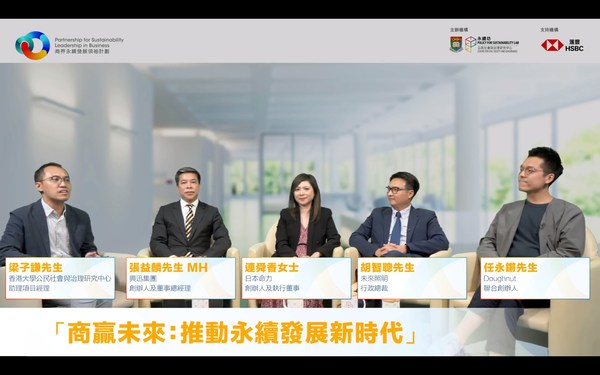SMEs Investing Sustainable Value Chains: An Imperative Effort to Respond to Rapid Changes on a Global Scale
HONG KONG, Nov. 9, 2020 /PRNewswire/ — In response to rapid social-ecological changes on a global scale—climate change, resource scarcity, social exclusion and change of customers’ aspirations— and the United Nations’ call for actions to attain the Sustainable Development Goals (SDGs), many businesses have risen to the challenges and taken actions to contribute to sustainable development. To support and further enhance these efforts and the business sector’s role in promoting sustainability, The Centre for Civil Society and Governance (CCSG) of The University of Hong Kong, with support from The Hongkong and Shanghai Banking Corporation Limited (HSBC), has initiated a four-year action research project—"Partnership for Sustainability Leadership in Business (PSLB)". This Project is the first-of-its-kind collaborative endeavor leveraging the strengths of academic institutions, businesses, regulators and the community at large to support the business sector, particularly small and medium-sized enterprises (SMEs) in Hong Kong and the region, to build Sustainable Value Chains (SVC) and to promote the SDGs.
Global sustainability challenges cannot be resolved with the effort of a single individual or sector. Besides the government, social institutions and local communities, more business leaders have stepped up and made contribution towards this important agenda. In the past couple of decades, many listed companies and multinational companies from Hong Kong and around the world have been adhering to the principles of sustainable development in their strategic management and operations. From the application of green energy and use of environmentally friendly materials, to reduction of carbon footprint and the adoption of ethical employment practices, companies have increasingly placed the sustainability agenda at the core of their business value.
As SMEs account for 98% of Hong Kong’s corporations and 45% of the territory’s total workforce, they are a major player in the economy. Many SMEs, however, lack the knowledge and experience in integrating and implementing sustainability measures in their operation. Faced with numerous sustainability challenges, ranging from global climate change and resource scarcity, to stringent regulation and unexpected disruptions in their global supply chains, SMEs often find themselves incapable of tackling these challenges effectively. Compared with big corporations, SMEs in general are less able to absorb risk due to thin resources and funds.
Supported by the HSBC, CCSG successfully launched a four-year action research Project (2020-2023), "Partnership for Sustainability Leadership in Business". The Project is led by Professor Wai-Fung Lam and a group of sustainability experts, with the aims of promoting collaboration and partnership between large corporations and SMEs through knowledge transfer, capacity building, network development, and building resilience against sustainability challenges.
The Project has engaged the Hong Kong Exchanges and Clearing Limited (HKEX) and the Business Environment Council (BEC) as Project Collaborators, and researchers of the Faculty of Business and Economics, HKU (FBE) as Research Collaborators.
This Project strives to foster collaboration between large corporations and SMEs, and to improve SMEs’ preparedness in taking on sustainability challenges, with a view to supporting the business sector of Hong Kong to create SVC. To achieve this goal, companies should integrate the principles and measures of sustainable development into their corporate governance and daily operations, strengthen workplace culture, foster the customer-and-supplier relationships, promote resources management, and improve innovation capabilities. All these are important building blocks for the nurturing of a sustainable society.
"Partnership for Sustainability Leadership in Business" consists of two key components—"Knowledge Inventory" and "Collaborative Leadership Scheme". The former is an online resource hub in which a whole array of resources and tools—"Best Practice Cases", "Guru Cases", "SME Sustainability Self-check Tool", "Kick-starter Impact Toolkit: Sustainability Roadmap", "Kick-starter Impact Toolkit: Sustainability Strategy and Action Planning Template", "Practical Guidebooks"—will be made available to businesses who are keen to integrate sustainability measures in their operations. The latter consists of knowledge-based collaborative events—"Knowledge Primers", "Practical Workshop", "Mentorship Programme", "Quick Connect", "Elite Roundtables" and other programmes—through which sustainability leaders in big corporations work closely with SME executives to build a talent pool of sustainability leaders for the business sector.
The Project is currently calling to large and small and medium-sized enterprises (SMEs) in Hong Kong for interests. More information about the Project can be found on: https://ccsg.hku.hk/pslb/.
About the Partnership for Sustainability Leadership in Business:
The "Partnership for Sustainability Leadership in Business" (PSLB) is a four-year (2020~2023) project initiated by the Centre for Civil Society and Governance, HKU, and supported by HSBC. The Project is led by Professor Wai-Fung Lam together with a group of sustainability experts. It is aimed at fostering sustainability leadership and collaboration in the business sector of Hong Kong through knowledge transfer, capacity building, and network development; in particular, the Project strives to foster strong partnerships between big corporations and small and medium-sized enterprises (SMEs) in pursuit of sustainability. The Project aspires to build a collaborative ecosystem which will enhance the capacity and role of SMEs in Hong Kong and the Greater Bay Area in attaining sustainable development.
About the Centre for Civil Society and Governance of The University of Hong Kong:
Established in December 2002, the Centre for Civil Society and Governance (the Centre) strives to enhance our knowledge of civil society and its contribution towards good governance, and to facilitate the attainment of a sustainable society through forging community-based, innovative solutions to inform policy deliberation and collective actions. The work of the Centre is organized around three Labs—the Policy for Sustainability Lab (PSL), the Social Entrepreneurship and Civic Action Lab (SECAL), and the Nonprofits and Philanthropy Lab (NPPL); each of them representing a research focus and an area of excellence of the Centre.

